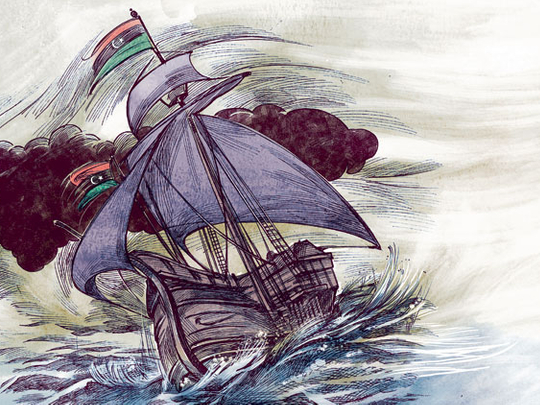
As Libya celebrated the first anniversary of the beginning of the popular uprising against Muammar Gaddafi's regime, and prepares for the first election in decades, the situation on the ground is far from what was intended by the so-called ‘revolutionaries' a year ago.
The interim ruling council, and its government, have no power beyond their offices in the capital. Disintegration of the country is far more deep and widespread than what we hear about in official statements and reports from the country.
The view from outside is that armed militias belonging to different groups of those involved in the rebellion against Gaddafi are not fully controlled by a central authority, but when you go there and meet people from less urbanised areas outside the two main coastal centres of Tripoli and Benghazi, you see a different picture and leave with the impression that Libya still has a long way to go before it becomes a state.
Since the end of war — yes it was a war towards the end, no more a ‘popular uprising', as Nato forces started bombardment and arms poured in for the rebels — in Libya, with the killing of Gaddafi, the National Transitional Council (NTC) failed to retain a government of national unity and was forced to sack it and appoint a government of technocrats.
The situation is getting more chaotic rather than stable. Militias some belonging to militant groups, others representing tribes and towns, are using guns to advance their narrow interests. In some towns and cities, different militias even fight to ransack government inventories — some of them military warehouses. These groups are wielding power over ordinary citizen who are as helpless as the central authority in Tripoli.
‘Gaddafi loyalists'
These groups are not just militants linked to Al Qaida, as the Gaddafi regime used to say to justify killing its own people, or politically-driven like the Qatar-linked Shaikh Ali Al Salabi's supporters, but just local armed men filling a void.
Those groups are not only seeking local power in towns and cities, including the capital and Benghazi, but they also drive their rivals away under the common accusation: ‘Gaddafi loyalists'.
Full towns are against each other: Misrata and Bani Walid are examples; even within the same town you find competing armed groups detaining, torturing and killing their rivals. It is more or less a turf war between gangs in a lawless arena. People who are not armed are also divided, and very few see that their country is ‘liberated' and heading towards becoming an inclusive, democratic state.
A majority of those who relied on the ‘state' are now helpless, and the interim authority can't easily find the money to pay public sector salaries and provide subsidised essential needs. Those who were influenced by regime propaganda of anti-Arabism and a more African Libya are wary of the revolutionaries' ‘gratitude' to Arab countries that helped the rebellion against Gaddafi. That is why it was not surprising to see Libyans dismantling Nasser's statue in Benghazi: a symbol of Arab nationalism some see as a hindrance to Libya's development.
It is true that Gaddafi, in four decades in power, suppressed any effort to build a real state in Libya fearing that he might lose power. In the process, the identity of the country and its people was almost deformed, and even with more urbanisation of Bedouin population tribal values were entrenched.
The educated elite either left the country for voluntary exile or suffered oppression under the regime. The problem with the way change happened in Libya is that what started as popular revolt turned quickly into a civil war with no real civil society — that's why it needed Nato bombardment and Arab arms for rebels on the ground (That's the major difference in the case of Syria, where regional and international players are seeking to learn lessons from the Libyan case).
Many Libyans see the new rulers as no more than Saif Al Islam Gaddafi, who was supposed to be a ‘moderniser', just selling the country's wealth to foreigners. The NTC is to hold general elections in June this year, hoping this will be a step forward in rebuilding post-Gaddafi Libya.
The election might go ahead, or be postponed a bit, but most likely it won't bring stability to Libya or even lead to the first step on the road to building a ‘democratic state' as preached by those involved.
Most likely it will be hailed in the media as a huge progress towards modernity and democratisation — exactly like the elections in Iraq under American occupation — but it won't be even a significant step towards rebuilding Libya. If occupation-sponsored elections in Iraq led to factional infighting, in Libya it could be more disastrous and divisive.
Dr Ayman Mustafa is a London-based Arab writer.










